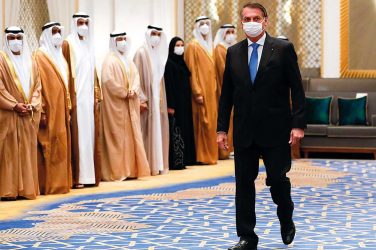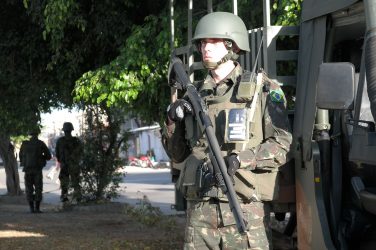 The gunning down of a string of candidates ahead of nationwide municipal elections this Sunday is stoking fears that Brazil’s toxic politics are headed into dangerous new territory.
The gunning down of a string of candidates ahead of nationwide municipal elections this Sunday is stoking fears that Brazil’s toxic politics are headed into dangerous new territory.
The main headline from Sunday’s polls is expected to be the hammering of the populist Workers’ Party, which many here blame for Brazil’s punishing recession and sprawling corruption scandals.
Already reeling from the impeachment of former president Dilma Rousseff and her replacement by center-right rival Michel Temer, the once-dominant Workers’ Party looks set to lose a slew of local seats, including the mayor of Brazil’s biggest city, São Paulo.
But analysts say that a recent spate of killings around Brazil points to a darker political shift. The latest victim was José Gomes da Rocha, running for mayor in Itumbiara in the state of Goiás, in Brazil’s Midwest.
He was shot dead, along with a police officer, while campaigning on Wednesday. The state’s deputy governor was also wounded in the attack in which the gunman was killed by security guards.

Supreme Court Chief Justice Gilmar Mendes called the incident “shocking.”
Worries about violence have prompted deployment during the election of extra army and elite police forces to 307 municipalities across 12 states, according to the official Agência Brasil news service.
The main hotspot is Rio de Janeiro, where 15 candidates or politicians have been murdered over the last 10 months, police say. Just last Monday, Rio city council candidate Marcos Vieira de Souza, nicknamed Falcon, was shot while campaigning for the rightwing Progressive Party in Madureira, northern Rio.
His execution-style slaying remains unsolved but Brazilian analysts and media quickly linked it to shadowy armed groups known as militias. De Souza, who headed one of Rio’s biggest and richest carnival samba schools, was also a police officer and had been cleared of militia-related charges back in 2011.
Another candidate for municipal government – José Ricardo Guimarães, who headed a private security firm – was shot dead the previous day at a rally in Itaboraí, also in metropolitan Rio.
We’re seeing a series of murders in northern Rio suburbs that are a new phenomenon and everything points to a link with political conflicts,” Michel Misse, an expert in security at Rio Federal University, said.
While Brazil’s bloody drugs gangs are well-known, the militias are more rarely discussed by officials or the media. Comprised of former or rogue police officers, the militias operate like death squads against criminals and run protection rackets
While their main activity has been battling gangs, the militias have also long tried to extend their influence into the political sphere. Those efforts now appear to be evolving into a new strategy.
O Globo newspaper reported on Wednesday that Rio militias were seizing Sunday’s elections as a way to expand business while influencing the vote.
Gangs have informed candidates that they must pay an “election tax” in order to campaign, with fees running from 15,000 to 120,000 reais (US$ 4,600 to US$ 37,000).
According to Globo’s investigation, militias even pressure candidates about the distribution of future posts should they win an election.
Dubious Donations
A study by the Supreme Electoral Board (TSE) revealed that 19.9 percent of the donations received by the candidates to mayors and councilors, which equals 300 million reais (over US$ 90 million) are being questioned for several reasons.
Questions rise due to the fact that among donors there are near 47,000 people unemployed, 22,800 citizens whose incomes are not in accordance with the contribution made and even 143 deceased.
The TSE also called the attention about 20 candidates who were shot dead in 12 states, including Bahia, Ceará, Goiás, Maranhão, Minas Gerais, Paraíba, Pernambuco, Rio de Janeiro, Rio Grande do Norte, Rio Grande do Sul, Santa Catarina and São Paulo.
In view of this situation, the Defense Minister announced that the elections next Sunday will deploy 25,000 Army, Navy and Air Force troops to strengthen security in 408 municipalities in 14 states, which are considered the most critical areas.
Next October 2, more than 144 million people will be able to vote in 5,568 municipalities, where mayors will be elected among 16,565 candidates.
MP/Bzz



